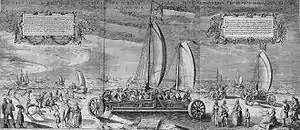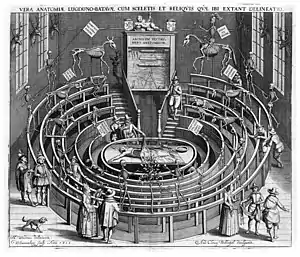

Willem Isaacsz van Swanenburg (29 January 1580 – 31 May 1612), was a Dutch Golden Age engraver and the youngest son of Isaac van Swanenburg.[1] Isaac van Swanenburg raised three sons who all became artists. Isaac van Swanenburg was also an artist who painted, designed prints, and created stained glass windows. The subject matter of his art included Biblical scenes, genre scenes, and portraits. He was also an illustrator for many books during his time.[2]

Biography
Swanenburg was born in Leiden. He learned drawing and engraving from his father, together with his brothers Jacob (1572–1652) and Claes (1572–1652), who both became respected painters.[1] According to Houbraken he was a respected engraver who became "Hopman" (flag-bearer) of the Leiden schutterij, but died young.[3]

References
- 1 2 Willem Isaacsz van Swanenburg in the RKD
- ↑ "Willem Isaacsz. van Swanenburg". FAMSF Explore the Art. 9 May 2015. Retrieved 7 May 2016.
- ↑ (in Dutch) Isaak Nicolai biography in De groote schouburgh der Nederlantsche konstschilders en schilderessen (1718) by Arnold Houbraken, courtesy of the Digital library for Dutch literature
External links
- Vermeer and The Delft School, a full text exhibition catalog from The Metropolitan Museum of Art, which contains material on Willem Isaacsz Swanenburg